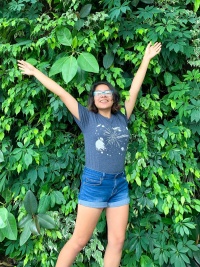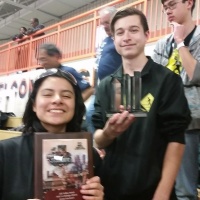Difference between revisions of "Ponette Rubio"
| Line 12: | Line 12: | ||
My name is Ponette and I am the first and only Ponette at the University of Michigan as of 2021. So much so that my unique name is my first name, ponette. | My name is Ponette and I am the first and only Ponette at the University of Michigan as of 2021. So much so that my unique name is my first name, ponette. | ||
| + | |||
[[File:Work.jpeg|200px|thumb|right|At my workplace smiling happily.]] | [[File:Work.jpeg|200px|thumb|right|At my workplace smiling happily.]] | ||
Revision as of 15:32, 4 March 2021
“What’s in a name? That which we call a rose
By any other name would smell as sweet...” [1]
Except that by any other more common name,
My online identity would be quite different.
My name is Ponette and I am the first and only Ponette at the University of Michigan as of 2021. So much so that my unique name is my first name, ponette.
Due to the unique nature of my name, a search for “Ponette Rubio” leaves very little room for confusion about whether or not the Ponette in question is indeed me. In middle school I tried to find another Ponette and wound up finding uncomfortable amounts of information about myself online. Since then, I have been quite intentional about making sure that I keep my life as private as possible without becoming a digital pariah. I keep my social media private and I am careful about what I post.
Despite guarding my information, a simple search of my name on any search engine still yields significant amounts of information about myself. My age, previous and current addresses, school and work locations are all readily available. I cannot control who sees this information. The more I begin to understand the internet, I realize that my name has marked me with a bright yellow flag. I will never have the anonymity that others with a more common name have. Even the absence of information about me stands out in ways it does not for people with more common names.
Contents
Is my life an open book?
Search Query: Incognito
I started out by looking myself up by first and last name on Chrome Incognito mode. First I saw work related articles about me and as I scrolled through I found my social media handles as well as pictures from high school competitions. I clicked on the pictures tab and I noticed that almost all the pictures that came up were of me. I was a bit surprised because many of these pictures were also on my social media and LinkedIn page. I also saw tagged pictures of my friends as well.
Search Query: Regular Search
Next, I decided I would look myself up by first and last name on Chrome regular search. I was surprised to find identical pages relating to myself. As I took a second look at my search results and I started to feel comforted by my online identity. For the most part, the information I could find was about my academic merits and work accomplishments. I began to wonder if perhaps my social media was an extension of my LinkedIn profile in the sense that it helped me create a version of myself that would appeal to people wanting to engage with me professionally. A product of how meticulous I had been in keeping my personal information private.
One thing that did bother me was that I could see my home address and even whether or not I am a registered voter. When I said I was ok with my voting record being public, I imagined my information would be used in order to tally up the amount of eligible voters in my state. I did not imagine that just anyone could simply search up my voting status. This made me become suspicious about how much control I have over my own information.
Holes or Clues?
While I knew I have been relatively successful at keeping aspects of my life away from my online identity, I began to realize that the act of not putting my most personal information online was itself a message to the online community. For example, I tend to use my social media as a way to broadcast my happy moments. When illness in the family brought on a period of hardship, I stopped posting because I did not feel like sharing my information. However people reached out to me because by not sending out information about myself, I was still sending out a message. Perhaps this will not be something that some random stranger can pick up on, but I still think about it.
Who gets to create online Ponette?
How much of my digital imprint serves the interests of others?
As I started looking at my search results, I began to notice that all the results were reflective of what my school, my work, my clubs wanted to share about me. Very little outside of my LinkedIn was really intentional information put out by me. In fact, I have little control once I give permission to an organization to use my name. I realized that I have a lot less power than I thought I did.
Would the online Ponette approve of me?
From a professional standpoint, I think that my online presence is a pretty accurate representation of who I am. I think work Ponette would be quite pleased with how I have kept up. However, on a more personal level, I find that perhaps work Ponette would be envious of how I have the freedom to live within my own bubble of privacy. Perhaps she would warn me to not take it for granted.
References
Google. “Google.” Google.com, 2019, www.google.com/.,
Shakespeare- ↑ Rocklin, Edward L. Romeo and Juliet. New York, Palgrave Macmillan, 2010.


